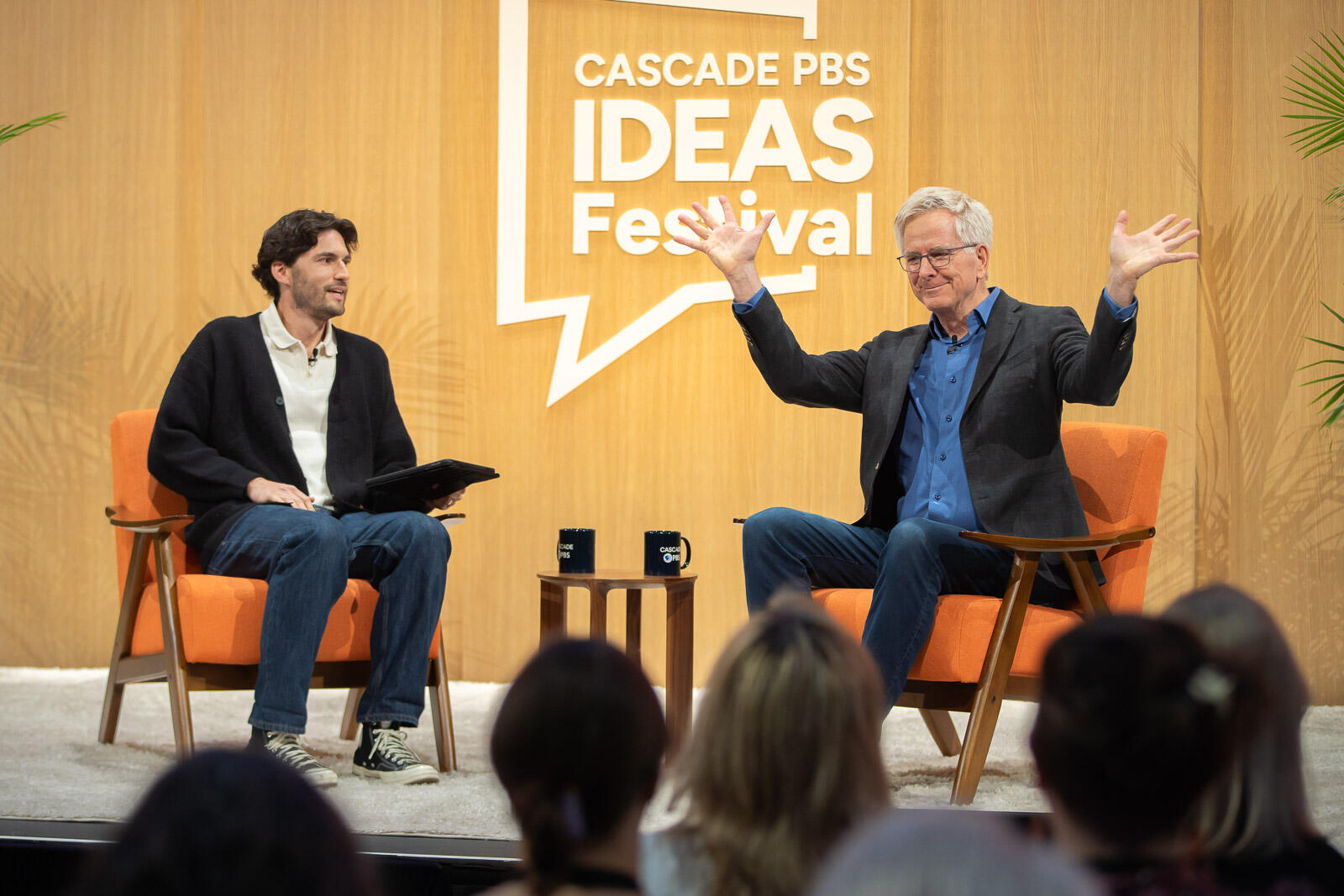The travel expert sat down with The Wall Street Journal to discuss how time abroad can help people understand different perspectives and bridge divides.
Ryan Knutson, host of The Journal, speaks with travel expert and author Rick Steves about traveling in 2025 and his experience with Americans’ reception abroad. (Christopher Nelson for Cascade PBS)
Writer Rick Steves has made a career of sharing travel tips and tricks. Now he recommends travelers steer clear of the U.S.
“To be honest, if somebody asked me, ‘Should I go to America?’ I’d say no,” he said in a discussion with The Wall Street Journal’s Ryan Knutson at the 2025 Cascade PBS Ideas Festival on Saturday. “We should pay the price for our policies.”
In the discussion, recorded as a live episode of the podcast The Journal, Steves talked about his latest book, travel philosophy and the role of exploration in combating American isolationism.
Steves first visited Europe in 1969 at 14. Now as the host of PBS travel show Rick Steves’ Europe and the author of a line of popular travel books, his philosophy encourages readers not just to vacation, but to explore.
Earlier this year, Steves released On the Hippie Trail: Istanbul to Kathmandu and the Making of a Travel Writer. The book documents his 1978 expedition along the infamous “Hippie Trail” from Europe through South Asia. Using his journal from the journey, Steves tracks his progress with photos, maps and handwritten entries.
“You’re talking about an age when there was not a glut of information,” he said. “When you leave Istanbul and head east, for me it was like going behind the dark side of the moon.”
Steves made the journey in his early 20s. Now 70, he said that while the physical Hippie Trail experience is no longer possible in the digital age, the adventure remains the same.
“You can have the Hippie Trail experience even in our comfortable age if you get out of your comfort zone,” he said. “When serendipity knocks, you say yes.”
In an age when more and more travelers plan trips based on social media and crowdsourced information, the most productive travel happens off the beaten path, Steves argued.
“The fundamental decision travelers have to make is, ‘Am I just going to do the bucket list thing?’ Or … explore the world and lose ourselves?’” he said. “Our mission, where I work, is to equip and inspire Americans to venture beyond Orlando.”
More and more Americans are doing exactly that. According to a recent study, 76% of Americans have left the country at least once, and over half have visited between one and four countries.
Despite this, isolationistic attitudes continue to take root, which led Knutson to wonder: “Are people traveling wrong?”
Steves is a vocal critic of the Trump administration and what he calls “childish ethnocentrism.” To combat this, he said, Americans need to focus on building bridges instead of walls.
“For me, the most profitable person on my tour bus would be the more conservative person that’s going to have a more broadening experience,” he said. “It’s a golden opportunity.” These experiences are, said Steves, “what it’s all about.”
“Fear is for people who don’t get out very much,” he added. “The flip side of fear is understanding, and we gain understanding when we travel. Who are the most fearful people in our society? People with no passports.”
Steves also touched on his cannabis advocacy, his role on the board of the National Organization for the Reform of Marijuana Laws and how perceptions of cannabis use differ between America and Europe. In the United States, said Steves, the issue is colored by a long history of racism, mass incarceration and a system that empowers organized crime.
“If I go home, I’m a tax-raising, churchgoing, grandkid-adoring, hardworking American citizen,” he said. “I have every right to just smoke a joint and stare at the fireplace for three hours.”
Listen to the full session in July on the weekly Cascade PBS Ideas Festival podcast.
This newsletter curates some of the most important headlines of the day from Cascade PBS and other news outlets.
We rely on donations from readers like you to sustain Cascade PBS's in-depth reporting on issues crticial to the PNW.
The Seattle landmark is experimenting with limited vehicle access during the summer before deciding if it will become a permanent policy.
©2025 Cascade Public Media. All Rights Reserved.
Terms of Use and Privacy Policy.




